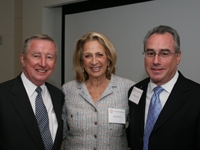For all the mysteries solved by modern medicine, there is still much we don't know about the workings of the human body. The brain — how it develops and even erodes — remains largely unmapped territory even in the 21st century.
Dr. Matthew Fink, professor of clinical neurology and vice chairman for clinical services in the Department of Neurology and Neuroscience at Weill Cornell Medical College, and chief of the division of stroke and critical neurology at NewYork-Presbyterian Hospital/Weill Cornell Medical Center, has spent almost three decades studying the brain and the neurological disorders — such as stroke and Alzheimer's disease — that can rob it of its utility.

Dr. Antonio M. Gotto Jr., Daisy Soros and Dr. Matthew Fink at the "Information Please" seminar, May 20.
During a presentation May 20 at the Medical College's most recent "Information Please" seminar at the Weill Greenberg Center, Dr. Fink discussed risks of stroke and Alzheimer's and what can be done to prevent them.
Founded by Weill Cornell Overseer Daisy M. Soros, Information Please offers friends of Weill Cornell Medical College the opportunity to learn about new research and other issues of contemporary relevance in medicine. Participants of this ongoing series interact first-hand with leading physicians and researchers in an informal setting.
Stroke, Dr. Fink said, is the third leading cause of death in the United States, claiming 150,000 lives per year. It is also the leading cause of long-term disability and the most common occasion for entry into a nursing home as 70 percent of stroke victims who worked before their stroke are unable to return to work after it.
But with proper prevention methods, strokes very much are preventable.
"With current knowledge and technology, we can prevent 50 to 80 percent of strokes," Dr. Fink said.
Operations such as carotid endarectomy — which removes the artery-blocking plaque that leads to stroke — can reduce the risk by 60 percent. Maintaining a healthy diet and taking statins can prevent atherosclerotic material from appearing at all, and can even cause the regression of plaque over time.
If the time for prevention has passed, it is important to know the warning signs of a stroke, and what to do if you start experiencing symptoms such as sudden weakness, numbness or paralysis of the face, arm or leg; unexplained dizziness; sudden severe headache with no apparent cause; or sudden blurred vision.
"The critical point is if you have symptoms, get to a hospital immediately," Dr. Fink said. "Do not delay."
Where a stroke is instantaneous, Alzheimer's and dementia run a more deliberate, corrosive course. But prevention is still possible.
The elimination of cardiovascular risk factors — such as high cholesterol and blood pressure — reduces the risk of dementia later in life, Dr. Fink said.
Exercise, diet and controlling your weight, especially abdominal girth, are also keys to retaining cognitive function.
"Physical exercise has a direct benefit on your brain," Dr. Fink said.
Photography by Joe Vericker.

